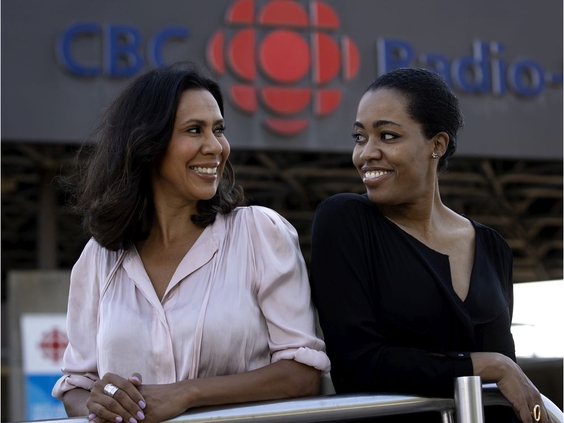"We all need to know our history better. In Quebec, there's this barrier where people refuse to recognize certain things. It's mind-boggling that in some parts of Quebec you still have to explain why black-face is wrong."
Isabelle Racicot and Martine St-Victor were watching the unprecedented social upheaval following the killing of George Floyd by a Minneapolis police officer this spring and the two old friends decided they needed to do a podcast about Black Lives Matter.
“We said we need to do a show, we need to talk to people who are part of the Black Lives Matter movement right now, who’re taking a stand,” said Racicot. “The fact that we were watching in real time what was going down. It was very emotional and very disturbing. We went back to CBC and said we want to talk about this issue, we want to have those very vulnerable and authentic and at times uncomfortable conversations about the movement, about what it means to be anti-racist. To talk to people who have the knowledge, who have solutions.”
In the summer of 2017, the two media personalities, who have been close friends for 20 years, did a radio show/podcast for CBC Radio called Seat at the Table. They had high-profile guests, everyone from bestselling author Malcolm Gladwell to hip-hop pioneer Grandmaster Flash, and they would have high-IQ off-the-cuff conversations with them. CBC quickly said ‘yes’ to the idea of a Black Lives Matter-themed version of the Seat at the Table podcast and the six-episode run will premiere Aug. 27 on all the main podcast streaming platforms, including Apple, Google, and Spotify.
“It’s about opening conversations and finally hearing a different perspective,” said St-Victor.
Racicot, who has hosted TV and radio shows in French and English, is also working on a French-language documentary about racism that will air in prime time on the ICI Radio-Canada TV network Nov. 23.
“One of the reasons I raised my hand pretty fast and went to Radio-Canada was because I was seeing that people in English Canada were doing special shows on racism and nothing was being done in French,” said Racicot. “I was like: ‘What’s going on? Why aren’t we having this discussion?’ Thankfully Radio-Canada said ‘Yes we’re going to do something.’ I would say that we francophones haven’t spent enough time learning about the true history here. We need to educate ourselves.”
Added St-Victor: “We all need to know our history better. In Quebec, there’s this barrier where people refuse to recognize certain things. It’s mind-boggling that in some parts of Quebec you still have to explain why blackface is wrong.”
St-Victor and Racicot will bring their personal history to Seat at the Table. Racicot’s biological father is Haitian and her biological mother is a white Québecois woman, and she was adopted and raised by a white franco-Québecois family. St-Victor was born in Trois-Rivières to parents who had immigrated from Haiti.
“I was always the only Black kid in class,” said St-Victor. “I’ve always known that Quebec and Canada is a very open society because of my background. One of the things that I think is really unfair is the picture that is painted of ‘les régions’. You know how they say people in ‘les régions’ are very closed. I think that’s very unfair. It can’t be more closed than it was in the ’70s and it wasn’t closed in the ’70s. It was a great upbringing despite the fact that (my brother and I) were the only Black kids.”
Racicot talked of how she and her husband recently had to have a conversation with their two teenage sons about racial profiling. Lying in bed later that night, it really gave her pause for thought.
“It’s not a conversation that’s easy or fun to have,” said Racicot. “It’s not the first time that we’ve had such conversations with the boys, but they’re 14 and 17 now and they understand more things and the fact that my older one is going to start driving on his own in a couple of weeks made it super important for (my husband) and I to talk to them. My husband Donald was giving the boys examples of his own personal experiences. What was really odd is that we were trying to normalize racial profiling for the boys because we didn’t want them to get too excited about it. And then I was in bed that night and I said ‘This makes no sense. Are we trying to normalize racial profiling to our kids?'”
St-Victor and Racicot also want to expand the discussion to include politics, culture and sports.
“One of the episodes is about sports and it’s 99-per-cent about hockey,” said St-Victor. “We’re going to look at the problem (of racism) in the NHL.”



























